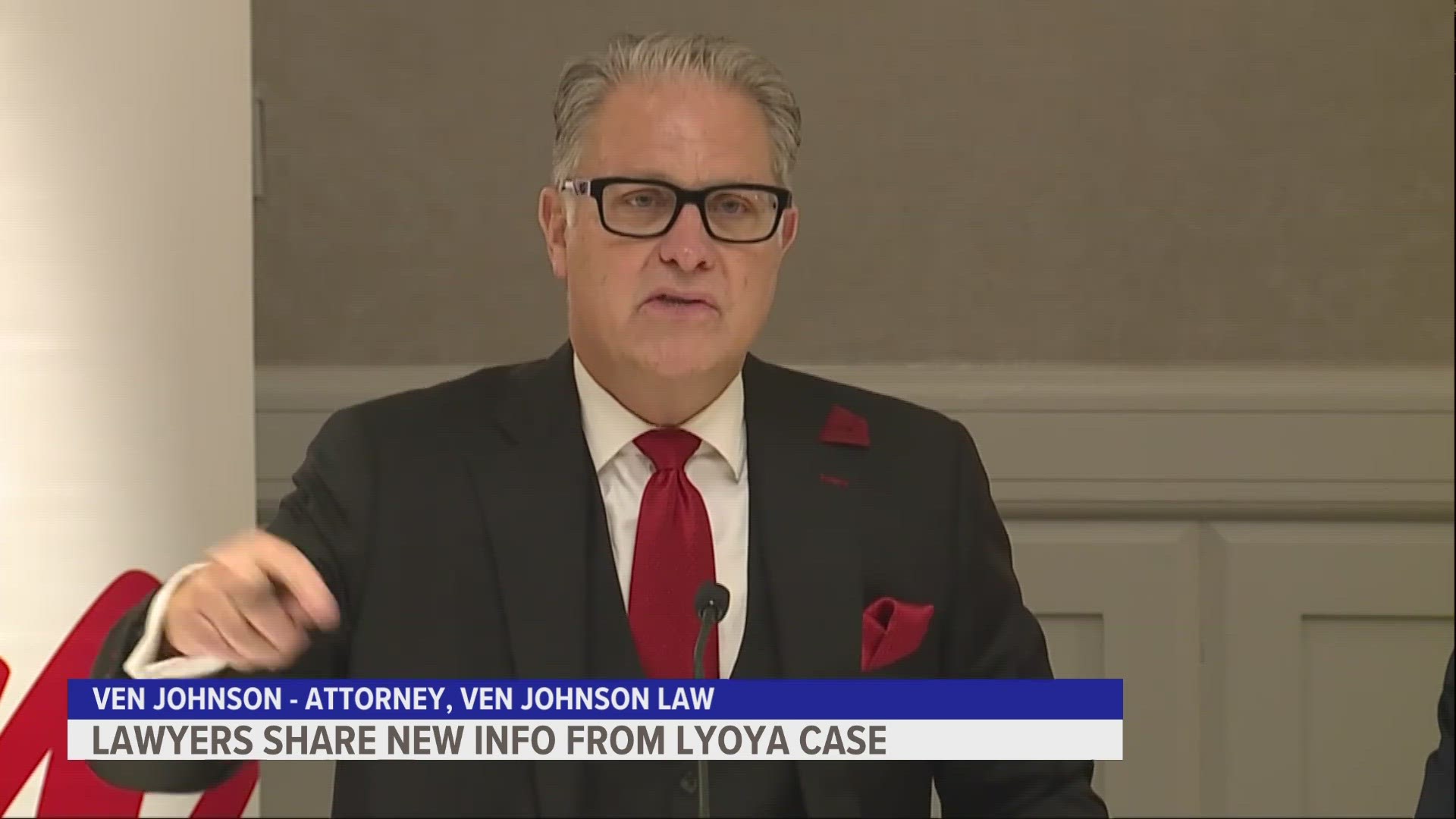GRAND RAPIDS, Mich. — Two experts retained by lawyers for Patrick Lyoya's family have submitted affidavits saying that former GRPD Officer Christopher Schurr broke from his training in the fatal traffic stop.
Schurr pulled over Lyoya on April 4, 2022 and after a struggle that lasted less than three minutes, Schurr shot Lyoya in the back of the head, killing him.
Lawyers Ven Johnson and Ben Crump announced Monday that they have retained two law enforcement experts who submitted affidavits saying that Schurr broke police protocols on several occasions during the traffic stop of Lyoya.
Thomas J. Tiderington, a former Chief of Police and 44-year law enforcement veteran, said in an affidavit that Schurr had no objective basis to pull over Lyoya.
"Based on the materials I have reviewed, there was no objective basis for Schurr to legally effect a traffic stop of Lyoya's vehicle until after Schurr turned around, sped-up and purportedly determined that Lyoya had an improper registered license plate," Tiderington said.
"This is simply a case of driving while Black," Ben Crump said during the announcement. "There were so many reasons why this was unjustified. But it all would have been avoided, if this police officer did not profile this Black motorist for driving down the street."
After Lyoya was pulled over, Tiderington notes that Schurr repeatedly deviated from his training during the altercation, including by not waiting for his requested backup to arrive and engaging Lyoya physically after Lyoya did not immediately comply.
Once the altercation between Schurr and Lyoya began, Tiderington argues Schurr did not use the Taser correctly, causing the situation to escalate. In order for Tasers to be effective, Tiderington said there must be space between the subjects, and Schurr did not create the space necessary to incapacitate Lyoya with the Taser.
He argued Lyoya never had full control of the Taser during the altercation and would likely not have known how to use it against Schurr had he taken it. Tiderington also said after Schurr discharged both projectile cartridges from the Taser, he should have known the Taser could only be used in stun mode, which would not have incapacitated him had Lyoya attempted to use it.
Tiderington also said Schurr could not have reasonably been in fear of his life when straddling Lyoya, who was face down, and that the fatal gunshot constitutes excessive force.
"Had Schurr followed proper protocols, Lyoya more likely than not would be alive today," Tiderington said in the affidavit.
The second affidavit was filed by expert W. Ken Katsaris, who has taught law enforcement subjects like traffic stop procedures and use of force in Florida for the past 30 years.
Katsaris' affidavit is consistent with Tiderington's, but adds that Schurr should not have physically engaged Lyoya after his initial Taser shot did not incapacitate Lyoya. Called "dual force," Katsaris explained that engaging in a physical altercation with a subject while holding a weapon gives the subject an opportunity to make contact with or take the weapon.
Katsaris also said Schurr should have employed more of his weapon retention training to keep Lyoya from getting near the Taser.
"It is my opinion that Schurr was less interested in properly using his department-issued tools as he was trained to do and more interested in having constant physical contact with Lyoya," Katsaris said.
Once Lyoya was facedown on the ground, Katsaris said Schurr should reasonably not have felt a fear for his life. He said Schurr should have created space and put obstacles between himself and Lyoya and continued using verbal commands. Katsaris said it was "unnecessary, objectively unreasonable, and a violation of (Schurr's) training" to instead draw and use his pistol.
"Schurr, nor any reasonably trained officer similarly situated, would have reasonably been in imminent fear for his life or the life of another. Hence, the shooting was not justified."
Both Katsaris and Tiderington said by not immediately firing Schurr, the City of Grand Rapids and the Grand Rapids Police Department implied his actions were not inappropriate.
The Lyoya family has filed a lawsuit against the City of Grand Rapids and Schurr claiming Schurr used excessive force and gross negligence in Lyoya's death.
Schurr's trial is expected to begin in October.
►Make it easy to keep up to date with more stories like this. Download the 13 ON YOUR SIDE app now.
Have a news tip? Email news@13onyourside.com, visit our Facebook page or Twitter. Subscribe to our YouTube channel.

